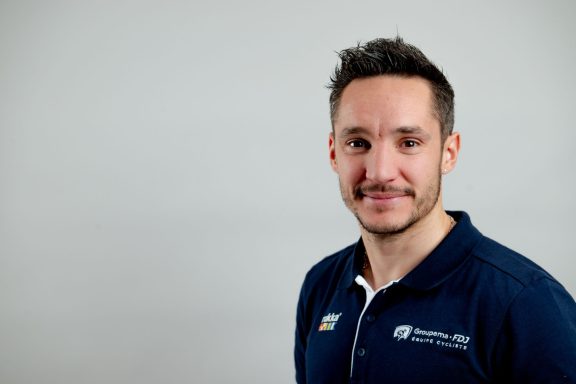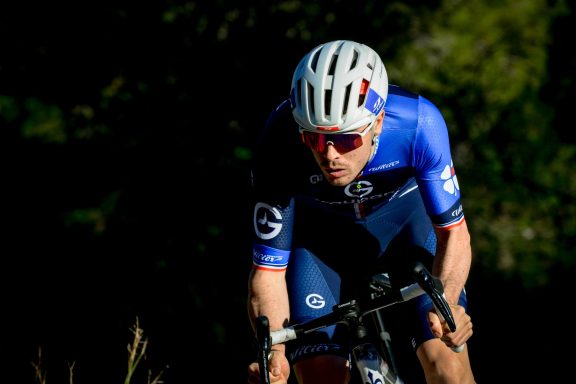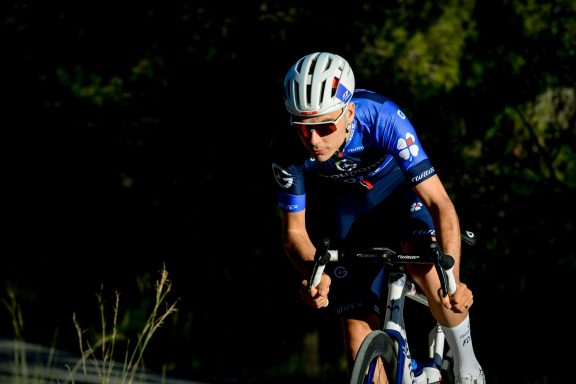2020 is drawing to a close, so now is the time to take stock. However, rather than asking for a purely sporting balance from the Groupama-FDJ cycling team’s general manager Marc Madiot, we asked him more broadly about the functioning and successes of the “company” in his whole at the end of a very special season. Also an opportunity for the French manager to take his hat off to his troops.
Marc, as a company head, how do you assess the year 2020?
I think we’ve got a pretty good record overall. The very first point, which naturally influenced everything else, is the confidence and security we got from Groupama and FDJ from the first day of the first lockdown. Straight away, their speech was: “We are there, we will do our part and we will make sure everything continues”. It made a lot of things simpler and allowed us to dispel some concerns that could legitimately arise. Then, as I have been able to say on several occasions, we Groupama-FDJ, but also the world of cycling as a whole, have always been focused on resuming rather than stopping. The idea that always took precedence over the rest was to get back into the race mode. Our objective was then to convey this information internally and to share this desire to start again. We never accumulated the worries despite the difficult health situation. Among the important dates of that period, I remember May 11. This is the date the riders were able to resume training. Because riders need a schedule, dates, an organization. Saying “train and we’ll see in 3, 4 weeks” doesn’t work very long. Then, the calendar gradually took shape with the League and the UCI, and it was necessary. It would have been a drama if the season did not restart. It would have been devastating for some of the cycling world’s stakeholders. As far as we’re concerned, the “company” is stable. It is in the same state as it was before the health crisis, so we are ready to get into the action at all levels. One of the team’s main qualities is that it was able to organize itself, or rather reorganize and rearrange itself according to the decisions that came from above, whether with regard to the calendar, the health situation or handling the Covid internally from a logistical and security point of view.
“The motivation, the organization and the will never fell”
The season was indeed marked by strict, rigorous health protocols.
Saying “we are going to resume” was not enough, it had to be done in acceptable and safe conditions for everyone. There were rather good talks and good coordination between the different cycling families. We were almost ready at the beginning of August, and we were fully ready at the end of August. Testing has grown, so have the means to test, and so has the scope of testing. We also benefited from the gradual progress in detecting and handling positive cases. Testing six and three days before competitions or camps also allowed us to manage things well and to avoid clusters. There were a few positive cases which were immediately isolated. We were therefore able to work in very decent conditions. The organizers have also gradually adjusted. We found a functioning system that allowed everyone to work safely. I’ve said it several times: we were safer in the races than at home. Internally, we set up the protocol as soon as we started to gather. We haven’t had a single gathering lasting longer than a day without a protocol being established and everyone being tested. We systematically all arrived in training or in competition tested. Logistically, it worked very well. Before every gathering, we would enter our data, our state of health, our potential symptoms, and the tests results on the platform. This gives the doctor a “live” situation on the entire team. All this was done with a dual objective: the health objective, namely to protect everyone, but also the objective of being able to race.
In this very special year, what struck you the most about your company’s functioning?
The main thing was that everyone wanted to keep moving forward; everyone was motivated to resume. We even had to slow down some of them, from the mechanics to the race service staff, but everyone was still moving in the same direction. The motivation, the organization and the will never fell during all these months. Everyone very quickly understood that we were in a particular year and that we should undoubtedly be more flexible, especially in terms of individual agendas.
The team had a first tough experience with the Covid, with some of its members getting stuck in an Abu Dhabi hotel…
At the time, we were barely discovering it… We had people in lockdown there and we didn’t know when or how they were going to come back. Today, this situation would necessarily be handled differently. At the time, we found ourselves a bit confused. We didn’t understand what was going on, they were just the early stages. I found myself in meetings at the Ministry and they were floundering just as much. Everyone was. I’m not sure if there’s a huge amount of positive to take from this episode, as we were mostly anxious about bringing them back. They were far from us, far from everything, so it was really difficult. However, I think they did well on site; they approached the situation in a good way. Maybe better than us in Paris.
“The machine kept rolling”
This health crisis required a real capacity for adaptation. In your opinion, did the team live up to this challenge?
Actually, it is also in such moments that you realize that everything is easier to handle when a team has high-level organization and structure. Today, we have a logistics capacity well over the average. The team as it was twenty years ago has absolutely nothing to do with what it is now and its ability to handle such a situation nowadays. Without a doubt, it is also thanks to its very solid foundations that the team was able to face this crisis under good conditions. Then, the technical means also progressed. IT resources have also made it possible to hold videoconferencing meetings with a few hundred people without the slightest problem. The season stopped but the Groupama-FDJ machine kept rolling.
A shaken season also means a shaken training schedule. Was this a real challenge for the coaches and the performance department as a whole?
It certainly was, but they managed it perfectly. First of all, and before thinking about tomorrow, since we didn’t know what tomorrow would be like, our first idea was to take a break. Rather than trying to do something a little crazy in training, or at home, making records of time spent on the rollers or other type of performance that we could see here or there, we said: “we stop, we recover, we take a deep breath and we reorganize ourselves as soon as we have the opportunity to do so”. During the lockdown’s first fifteen days, the riders took a complete rest. If we had continued to train intensely on the rollers during this entire period, we would have paid for it, doubly, at the season restart, that’s for sure. The idea was to get some physical and mental freshness for the time we would be able to resume. As soon as we had some certainties in terms of the calendar, we were able to reorganize ourselves and the coaches then carried out their mission of calibrating and adjusting the riders’ activity.
Then came those three and a half months of relentless competition.
Then, it was more of a logistics exercise. On the front line, there were above all the mechanics and assistants, as well as the sports directors, who not only had to set the race programs, but also to have the trucks, buses and cars ready, and to find the simplest way to go from one point to another. It required real agility in terms of logistics, but there were no shortcomings. It’s not necessarily the first thing you think of, but it’s vital. If you don’t have your truck and your bikes to race, you can’t race. Beyond that, there was also the airplanes issue, of course. We also had to be able to react quickly if a rider was positive three days before the start, and therefore have replacements and equipment at short notice. It was necessary to be fairly flexible in operation. From this point of view, for example, Martial Gayant and Thierry Bricaud played an important role.
“We must highlight what was done before and after the Tour”
Was the usual work of the staff on site made more difficult over these three months?
Their mission was made a bit more complex, especially with regard to the precautions and the measures to be respected, but not that much in the end, as the organizers actually did their job well. Of course, there were a few small issues here and there, but in general the hotels received a good briefing and were well organized. We were always in a reserved room, with the masks and the gel. In competition, we never had one single case as far as we are concerned. So overall in the races, it went well. There can always be a hitch, like a barrier that lets people through, but the mission was well done overall by the organizers, whether big or small. This is not closely linked to the Covid situation, but the cooking sector, which we have wanted to optimize for a few years now, obviously played its part in this period. In view of the context, it was surely not easy for the hotels to provide catering as it previously could have been. Having our own cooks allowed us to overcome all of this.
Let us come to the purely sporting section of things. What would be your brief assessment of the 2020 season?
If we leave out the Tour, for the reasons that we know, with this crash from day one, the rest was pretty good, if not very good. We got twenty-one victories with a quarter of racing less than usual. We are where we should be. Despite everything, it’s a good season. It’s true that the Tour overshadows a lot of things, but that’s also why we must highlight what was done before and after. Disappointments are still disappointments, but we must be delighted with what we have achieved elsewhere. For example, the fact that Arnaud Démare is the rider who has won the most races during the season is a first for us. Having a rider of the team as the most successful rider of the year is to be remembered and emphasized.
Was the sponsors’ exposition objective met despite a shortened season?
For now, it’s difficult to assess, but overall I think we have tried to make as many images, photos, interviews and words as possible available to our partners, whether the main ones or the smallest, through our various media. We have also made progress in this area. We have developed well in terms of internal and external communication of the team. In this particular year, during which the competitions stopped, the idea was to continue to support our partners and give them visibility. It was very important. We had to feed social networks and others, and I think we did it pretty well, with cohesion and consistency. The easiest thing would have been to provide a lot of material at the start but to run out of it after a few weeks. It had to be structured and I think it was done pretty well. The fact that the team continued to exist even without the races, I think it is a guarantee of quality. We also judge the level of a team and an organization when it is able to keep the machine running even when there is no competition. This shows the level of investment and the quality of the work provided.
What is your view on the Conti’s second year of existence?
Our “baby” continued to develop, but above all, it was a great support and complement to the WorldTour. In this particular year, the Conti was a constant support. It was something very important as well. This allowed us to test a few riders in the WorldTour, and eventually recruit some. The bridges between the two groups have intensified this year and will continue to intensify in the future. Calendar compression forced us to be responsive and inventive at all times. In 2021, we will obviously build on what we were able to do in 2020, but by programming and structuring it further upstream. In any case, the Conti fulfils its role: namely to save time and allow the youngsters who get to the WorldTour to be operational more quickly than before. We are therefore rather on a good footing, and the year 2020 also allowed us to add a new level to this training course with the Juniors program. Our strategy is not to aim for quantity. The idea is to aim for the best of the best.



No comment